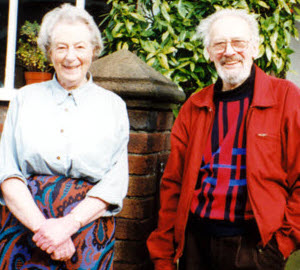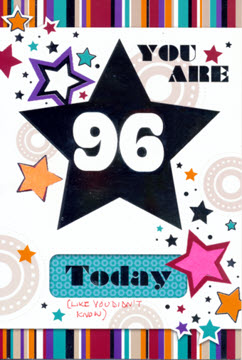|
 Marion Eadie was born in Glasgow in the summer of the final year of what should have been The War To End All Wars. Her family knew hard times in the Depression of the 1930s but Marion rose above them, she did well at school; she even won a medal; and she became well known in amateur science and science-fiction fandom circles as the president of the Junior Astronomical Association, of which she was a founder member and president. Marion Eadie was born in Glasgow in the summer of the final year of what should have been The War To End All Wars. Her family knew hard times in the Depression of the 1930s but Marion rose above them, she did well at school; she even won a medal; and she became well known in amateur science and science-fiction fandom circles as the president of the Junior Astronomical Association, of which she was a founder member and president.
As editor of Urania, the society's journal, she became one of the early publishers of work by Arthur C. Clarke – then a space-travel and science fiction fan rather than a famous author. Another of her contributors was Harry Turner, a young artist living in Manchester, who was also interested in astronomy, space travel, rocketry and science fiction. They exchanged lots of letters, Harry joined the JAA's management team and Marion eventually met Harry at the 1938 Empire Exhibition in Glasgow.
Marion moved to a job in Manchester when another European war broke out and contributed stories, poetry and editorial skills to Zenith, a science fiction fanzine published jointly with Harry. She also became one of the first female writers of science fiction to sell work to a professional magazine. Sadly, the war's paper shortages brought a premature end to the life of Tales of Wonder. And Urania, too.
Harry had registered for military service at the start of the war but the Germans kept bombing his records. Marion and Harry decided to get married in the summer of 1942, but the RAF turned everything into a scramble by sending Harry his call-up papers a fortnight before the planned wedding date!
Harry became as a radar technician working in the south-east of England, which meant periods of separation between his leaves. The separation became complete for over a year shortly after the birth of Philip, their first son. The RAF sent Harry to India as the focus of World War 2 switched from Europe to the Far East. The war ended shortly after Harry reached India but the government chose not to make any effort to bring the troops home, and Harry remained stuck in southern India until the latter half of 1946.
The demands of family life increased after the war. Two more sons arrived; William, named after Marion's father, and Robert, named after her uncle, the Glasgow artist Robert Eadie. The family also moved twice; from the Manchester home of Harry's parents to a house in Moston, into which a few sticks of furniture had to be crammed to prevent the council from grabbing it as abandoned, and then to a larger house in Romiley, where both Marion and Harry spent the rest of their days.
Marion was able to resume her writing career when the boys were grown up. She had a long and successful career writing scripts for girls' magazines published by D.C. Thomson of Dundee. She also began to learn languages. Having taken French and Spanish to A-Level standard, she delved into the mysteries of Mandarin Chinese, which is said to be easy to pick up as a spoken version and fiendishly complicated to write. Marion's personal library of books continued to grow as she pursued her interests in things astronomical as well as space travel, the history of her native Scotland, language and literature, ancient civilizations, the writings of Roman scholars and much, much more. In her final months, she was dividing her reading time between Red Moon Rising by Matthew Brzezinski (an account of the period between Sputnik and the explosion of the Space Race) and 101 Things To Do With A Stone Circle by Geoff Holder.
Her husband, meanwhile, had become the manager of the Advertising & Promotion Department at the Manchester Evening News and Harry established an international reputation as a graphic artist and an expert on the early years of science-fiction fandom; both he and Marion had known just about everyone who was anyone during the late Thirties and early Forties, and most of them had visited Harry's parents' home in Victoria Park, which had become the focus of science fiction fandom in Manchester.
Marion's sons Philip and Bill both adopted a “please yourself” approach to life, the one lost in his own creativity and the other reinventing his life every decade or so. But Robert met someone whom he wanted to marry, and he and Christine gave Marion three much-loved grandchildren: Paul, Laura and Michael. And, in the new century, Paul began a new generation of Turners with his son Tiago.
Their mutual interest in astronomy put Marion and Harry on a cruise to view a total eclipse of the sun in 1973. Patrick Moore was also on the cruise, and the Turners were regular viewer of his Sky at Night programmes on TV. Marion instigated a family trip to Cornwall for the 1999 total eclipse. Patrick Moore was also there, and also in an area which was clouded over. Luckily, there was a fine day in Romiley for the 2006 transit of Venus, something which Marion had been looking forward to for years. The Turners also made expeditions into the back garden on clear nights to view eclipses of the Moon, and the passages of the Mir space station, the International Space Station and the brilliant flares generated by satellites of the Iridium phone network.
Marion survived bowel cancer in her late 70s. She became part of the Computer Age and retired her trusty typewriter. She was able to keep going quite well until her nineties, despite the added stress of looking after her husband as his life came to an end. Then her health became uncertain and her horizons shrank. But on good days, she was able to continue to organize her household, read her way through a mountain of books, do Daily Mail and Sunday Post crosswords, add to the collections of notes on her vintage computer and make the occasional foray onto the internet with a more up-to-date notebook computer. And when she took delivery of her half of the Daily Mail in the morning (known affectionately to herself and Philip as the Daily Disaster because there was usually doom and gloom on the front page), she always turned to the Peterborough page first to find out if one of Philip's contributions had been used.
In her ninety-fourth year, Marion had a fall which put her in hospital for a half-hip transplant. She also acquired a heart pacemaker when other health problems were investigated. Four months later, she returned home and she was able to retain access to the whole house with the aid of a stair lift, her upstairs and downstairs walking frames, and the carers who helped her to get her day started.
 Marion Turner lived through extraordinary times before any of her children came along. She lived in cities which were subject to bombing raids by night over many years. She served as an air-raid warden, which meant that in addition to doing a job through the day, she had to be up half the night as well. Marion Turner lived through extraordinary times before any of her children came along. She lived in cities which were subject to bombing raids by night over many years. She served as an air-raid warden, which meant that in addition to doing a job through the day, she had to be up half the night as well.
She became famous in the family for being able to sleep through stressful events. During the war, she managed not to be awakened by a V1 flying bomb passing over an hotel in Lincoln, where she and Harry were spending his Xmas 1944 leave. And whilst the Romiley earthquake at 1 a.m. on a February morning in 2008 woke up both Harry and Philip, Marion continued to slumber undisturbed. (although, she did feel the 2 a.m. Manchester earthquake on 1944/12/29)
Like Harry, her husband, Marion felt at the end that she had been in the world long enough, and she made the final journey from life into the memories of those who knew and loved her at the age of 96, with no regrets.
“ . . . adieu, adieu,
I can no longer stay with you.
I'll hang my harp on a weeping willow tree,
And may the world go well with thee.”
|











